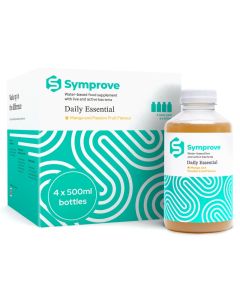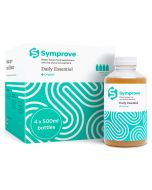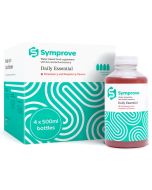
Key Reasons To Take Probiotics During Pregnancy
Pregnancy can come with a range of questions and concerns, especially when it comes to supporting health and wellness. One common query that expectant mothers often have is whether they should consider taking probiotics during pregnancy.
Probiotics, such as the well-known brand Symprove, have gained significant attention for their potential benefits in supporting gut health, but are they really safe and beneficial during pregnancy? Let's delve into this topic to understand the potential benefits, risks, and what probiotics may be considered during pregnancy.

Understanding Probiotics: What Do They Do?
Before delving into the specifics of probiotics during pregnancy, it's essential to understand what probiotics are and how they work.
Probiotics are supplements that provide live microorganisms, mainly bacteria and some yeasts, supporting our health when consumed in adequate amounts. These beneficial bacterias play a crucial role in maintaining a balanced gut microbiome, which is vital for digestion, immune function, and overall well-being.
How Do Probiotics Support Pregnancy?
The maternal-foetal gut microbiome during pregnancy has gained significant interest due to its profound impact on both maternal and foetal health. A balanced gut microbiome can help to regulate immune responses, support nutrient absorption, and may even influence mood and mental health. The main source of a newborn’s intestinal microbiota is the maternal gut, therefore the mothers maternal gut health can affect the developing baby's gut microbiome, potentially influencing their long-term health outcomes. Studies have found that the absence of a healthy microbiome may be associated with deficits in neuronal development, impaired stress adaptation, and metabolic dysfunction later in life. Probiotics may also reduce the risk of dysbiosis of the gut microbiome during pregnancy, associated with gestational diabetes, preeclampsia and restricted foetal growth.
This highlights the importance of the mother’s gut health, not only for her own health but also for the health of her baby.

Benefits of Probiotics During Pregnancy:
Probiotics may offer several potential benefits for pregnant women, by either restoring or maintaining the mothers material gut helping to improve:
Nutrient Absorption:
Probiotics may benefit both the mother and baby by enhancing nutrient absorption. During pregnancy, probiotics help balance the gut microbiome, facilitating the digestion and absorption of essential nutrients. This optimised nutrient uptake supports the health and development of both the mother and the growing baby. By promoting a healthy gut environment, probiotics contribute to efficient nutrient absorption, ensuring that both mother and baby receive the necessary nutrients for optimal health.
Alleviation of Common Pregnancy-related Digestive Issues:
Probiotics support may reduce symptoms such as bloating, constipation, and indigestion that are often experienced during pregnancy. These beneficial bacteria promote healthy digestion, support regular bowel movements, and alleviate discomfort.
Immune function:
By promoting a healthy gut balance, probiotics may enhance the maternal immune system, lowering the risk of infections and illnesses. Studies suggest probiotic supplementation could reduce pregnancy complications such as gestational diabetes and preeclampsia (high blood pressure during pregnancy and after labour). Maternal intake of probiotics also influences breast milk composition, benefiting the baby's developing immune system. Research indicates probiotics in breast milk may lower the occurrence of common childhood illnesses and allergies in infants.
Mental Health:
Around 1 in 10 women suffer depression or low mood during and after pregnancy. Research suggests that the gut-brain axis plays a significant role in mental health, and probiotics can help regulate this connection. By promoting a healthy balance of gut bacteria, probiotics may reduce inflammation and produce neurotransmitters that positively influence mood. A study found that women who were supplemented with probiotics scored significantly lower depression and anxiety scores than the placebo group in the postpartum period.
Skin complications:
Imbalances in the gut microbiome may contribute to skin issues such as acne, eczema, and dermatitis. A study revealed that maternal probiotics in breast-fed infants can reduce the risk of the baby developing eczema.

When To Start Taking Probiotics For Pregnancy
Start probiotic supplementation early in pregnancy.
The timing for starting probiotics during pregnancy may vary depending on individual circumstances and preferences. However, it is best to start probiotic supplementation early in pregnancy, ideally before conception or during the first trimester. This early start allows time for establishing and/or restoring a healthy gut, which can benefit both maternal and foetal health throughout pregnancy.
Choosing The Right Probiotic Strain For Pregnancy:
The best probiotic strains for pregnancy are those that have been studied for their safety and effectiveness in supporting maternal and foetal health. Some of the most commonly recommended probiotic strains for pregnancy include:
- Lactobacillus rhamnosus GG (LGG): A well-researched strain known for its gastrointestinal and immune health benefits.
- Lactobacillus acidophilus: Supports vaginal health, digestion, and overall immune function.
- Bifidobacterium bifidum: Promotes gut health and aids in digestion.
- Lactobacillus reuteri: Inhibits harmful bacteria growth and supports gut health.
- Bifidobacterium lactis: Enhances digestive health, reduces inflammation, and boosts immune function.
Taking Symprove During Pregnancy
Among the plethora of probiotic supplements available, Symprove stands out as a recommended choice for pregnant women. Symprove is a liquid probiotic supplement that contains live, active bacteria, including the strain Lactobacillus rhamnosus NCIMB 30174 (Acticaseibacillus rhamnosus).
By restoring balance to the gut microbiome, Symprove can help to alleviate common digestive discomforts like bloating and constipation while supporting efficient nutrient absorption crucial for foetal development and maternal health. Trusted for its safety and reliability, Symprove may navigate the transformative journey supporting both the mother and baby.

Symprove survives stomach acid
What sets Symprove apart is its ability to survive the acidic environment of the stomach and reach the intestines alive, where it can effectively colonise the gut compared to traditional capsule-based probiotics.
Symprove's unique formulation also contains ascorbic acid (Vitamin C) which supports the growth and survival of beneficial gut bacteria, enhancing their effectiveness in promoting gut health and overall well-being.
Safety Profile:
One of the primary concerns when considering probiotics during pregnancy is safety. Fortunately, Symprove boasts a robust safety profile, making it suitable for pregnant women. It does not contain any ingredients contraindicated for pregnant or breastfeeding women, providing peace of mind to expectant mothers.
Directions for use:
- When: In the morning, on an empty stomach or 10 minutes before consuming food and drink.
- Dosage: 70ml of Symprove once a day.
When incorporating Symprove into your prenatal routine, it's essential to follow dosage and usage recommendations. Pregnant women can safely take Symprove, and there is no lower age limit for its consumption.
The recommended dosage should be measured to 1 mL per kg of body weight. It's advisable to take Symprove first thing in the morning, on an empty stomach, ideally waiting for 10 minutes before consuming warm beverages or breakfast to optimise its effectiveness. Shake well before using.
Side Effects of Probiotics During Pregnancy
While probiotics are generally safe for most pregnant women, potential side effects are rare and may include temporary digestive discomfort such as gas or bloating. Rare allergic reactions or infections could occur, particularly in individuals with compromised immune systems. Additionally, probiotics may interact with certain medications or supplements. Consulting with a healthcare provider before starting probiotics during pregnancy is essential to ensure safety and address any concerns. Opting for a reputable brand such as Symprove and following recommended dosages can help mitigate the risk of adverse effects.
People Also Ask...
Is Symprove Suitable for Vegans?
Yes, all Symprove probiotics come are suitable for vegans and vegetarians.
Are there any allergens in Symprove?
All Symprove probiotics are free from gluten and dairy.
What Do The Symprove Flavours Taste Like?
Symprove comes in 3 differenct flavours including Original, Mango and Passion Fruit, and Strawberry and Raspberry.
- Original is the most natural-tasting flavour with a slight sourness.
- Mango and Passion Fruit is slightly sweeter than the Original flavour with a shark kick.
- Strawberry and Raspberry is the sweetest option out of the others, with a slight floral taste.
By Rhysa Phommachanh, BA (hons) Specialist Hair and Media Make-up / Head of Digital










